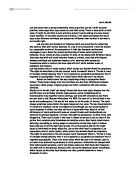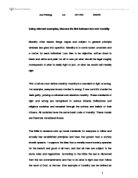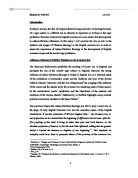Morals are beliefs about the way human beings living in communities should behave. These morals change over time and there are also clear differences between age groups, ethnic groups, religious groups and other communities who hold common attitudes.
Morals are to do with ‘right’ and ‘wrong’. Issues that have seen major changes over the past 50 years are attitudes towards single parents, sexual orientation such as homosexuality, living together before marriage, and even with obscenity as now there are acts such as the Obscene Publications Act 1959. For most of us, the attitude is less harsh and condemnatory. ‘Live and let live’ seems to be the order of the day. The moral change sometimes comes before the legal change and vice versa. The key characteristics of morals are voluntary; morals are subjective and although one may be persuaded by moral argument of others, one does not have to agree with them. Most of us hold differences of moral position with even our closest friends and families. Morals are enforced by informal sanctions. At times, this might be persuasions, at other times, mild disapproval. There may be times if the issue is viewed as serious by one or other of the parties that complete social breakdown and isolation occurs. Most moral stands involve informing, persuading or forcing people in communities on how they ought to behave. Even when one is hold the high moral ground, the critical person will see the ‘ought’ issues as individually or group subjective. Law on the other hand is compulsory; Law represents codes of social conduct, which society has decided should be compulsory. This might be described as the only common ‘moral framework’ there is. The law is a way of formally stating behaviour that is to be regarded as acceptable and behaviour that is regarded unacceptable. There is no choice about which laws are to be obeyed. Laws do not need to be enforced by persuasion or social pressure. Authorities are charged with their enforcement and police, courts and prisons make sure that those who transgress are dealt with by due process. Baring in mind, law can be introduced almost immediately, whilst morals, on the other hand develop over time, possible hundreds or even a thousands of years.
The debate of Hart v Devlin arose from the discussions around the legislation of prostitution and homosexuality in 1957. Professor Heart believed that law and morality should be kept separate, that morality should not influence the direction of the law. Private moral behaviour was best left to the individual and the state had no right to get involved in moral issues where there was no harm done to others. A key problem with this issue is when and who should decide whether harm or no harm has occurred, its normally the courts, parliament and the public who tend to decide.
Lord Devlin believed that moral behaviour could be improved by using the power of law. Moral behaviour that was disapproved of the majority should be made illegal even when it involved no harm to others. A key problem with this position was deciding who morality should be made illegal and whose should not. Devlin argued that a common morality was essential for society.
Criminal law has an influence in many obvious areas where we would expect it to be. Murder, offences against the person and theft are very anti-social offences and the courts see a central role for themselves in deterrence and punishment. Even in a pluralistic society there will be a few who would be critical of these core areas of belief.
There are other areas that are less clear. The use of law to regulate private sexual behaviours, sexual orientation and drug consumption may be argued by some as infringements of civil liberties and no place for the law to be. Edwin Schur would have clearly backed the position of decriminalisation of these grey area crimes.
When the law attempts to enforce a legal position, there is a change in who is interested in upholding the accepted moral position. It may move from peer pressure (friends), family, church and community, to the police service and the courts system. Most of the time people obey the laws because there is general support for them in the community. For a smaller group, the fear of punishment may keep them in line. For a small minority, these systems of law and order are needed to tackle their illegal unacceptable behaviour.
Within Civil law the courts often find themselves at the centre of a hugely difficult moral discussion involving life and death, classic examples were: Diane Pretty 01, a lady who was confined to a wheel chair due to a disease, she had difficulty in talking, eating and sleeping, and no medical intervention could keep her alive, Mrs Pretty went all the way to the European Court of Human Rights to pursue permission for euthanasia but was refused, and later died. Miss B 02, Mary and Jodie 00 and Mr Tony Bland 93, are other great examples. Mrs Victoria Gillick 85, was an unusual case has a Catholic mother thought a local GP was supporting the breaking of the law, as her daughter was able to receive contraceptive devices and information without the mothers knowledge.
Topics such as abortion and human cloning have also been debated within the commons and now there is legislation for both the issues.
The moral dimension to tort is seen in Donoghue v Stevenson 32 case. Lord Atkins neighbour principle draws from the biblical principle of ‘Thou shalt love thy neighbour as thyself’. The neighbour principle underlines the responsibility we must have towards those who we deal with even if it is only in commercial terms as between a producer and a consumer. In addition, the overall purpose of tort is to put a wrong, right.
At the heart of contract law is a promise between two parties to uphold obligations that they have freely entered into. The law only steps in to allow these promises to be met. If one party lets the other down, the courts have a range of sanctions available at its disposal, but at the heart of all of these is the hope that the party who reneged on their duty will fulfil their pledge.







